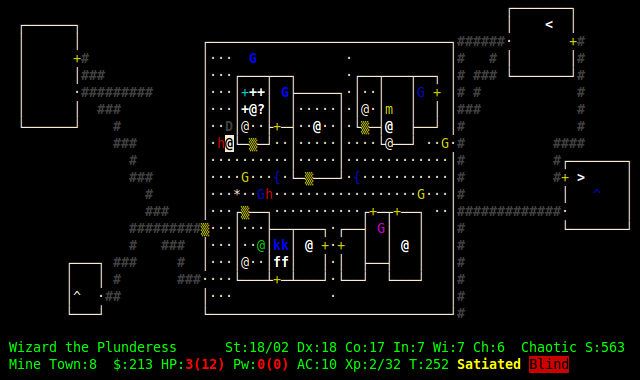This repository contains 2 reinforcement learning implementations to play the game of NetHack. Nethack is popular single-player, terminal-based, rogue-like game that is procedurally generated, stochastic, and challenging. The NetHack Learning Environment (NLE) is a reinforcement-learning environment based on NetHack and OpenAI's Gym framework and was designed to pose a challenge to the current state-of-the-art algorithms. Due to its unique procedurally-generated nature, this testbed environment encourages advancements in various aspects such as exploration, planning and skill acquisition amongst many others. We present 2 RL algorithms in this repo, namely, a Deep Q-learning Network and a Monte-Carlo Tree Search (MCTS) algorithm. From these 2 approaches, the MCTS approach consistently achieves superior results (and is therefore the recommended implementation) as opposed to the DQN-based approach.
To run the agents on Nethack Learning Environment you need to install NLE.
NLE requires python>=3.5, cmake>=3.14 to be installed and available both when building the
package, and at runtime.
On MacOS, one can use Homebrew as follows:
$ brew install cmakeOn a plain Ubuntu 18.04 distribution, cmake and other dependencies
can be installed by doing:
# Python and most build deps
$ sudo apt-get install -y build-essential autoconf libtool pkg-config \
python3-dev python3-pip python3-numpy git flex bison libbz2-dev
# recent cmake version
$ wget -O - https://apt.kitware.com/keys/kitware-archive-latest.asc 2>/dev/null | sudo apt-key add -
$ sudo apt-add-repository 'deb https://apt.kitware.com/ubuntu/ bionic main'
$ sudo apt-get update && apt-get --allow-unauthenticated install -y \
cmake \
kitware-archive-keyringAfterwards it's a matter of setting up your environment. We advise using a conda environment for this:
$ conda create -n nle python=3.8
$ conda activate nle
$ pip install nleTo generate a ttyrec and stats.csv:
$ python3 src/agent1/save_run.pyTo evaluate a random seed:
$ python3 src/agent1/evaluation.pyTo run tests on the five seeds in the paper:
$ python3 src/agent1/RunTests.pyTo use the agent import MyAgent.py and Node.py then create an agent by:
agent = MyAgent(env.observation_space, env.action_space, seeds=env.get_seeds())Results from the runs in the report (for the MCTS implementation)
You may download the pre-trained weights here.
To train the DQN:
$ python3 src/agent2/train.pyTo evaluate the model, please specify the seeds you would like to evaluate in evaluation.py and execute:
$ python3 src/agent2/evaluation.pyTo use the agent, import MyAgent.py, configure the hyper-parameter dictionary and create an agent by:
hyper_params = {...}
agent = MyAgent(
env.observation_space, # assuming that we are taking the world as input
env.action_space,
train=True,
replay_buffer=replay_buffer,
use_double_dqn=hyper_params['use-double-dqn'],
lr=hyper_params['learning-rate'],
batch_size=hyper_params['batch-size'],
discount_factor=hyper_params['discount-factor'],
beta=hyper_params['beta'],
prior_eps=hyper_params['prior_eps']
)- Mayur Ranchod
- Wesley Earl Stander
- Joshua Greyling
- Agang Lebethe
